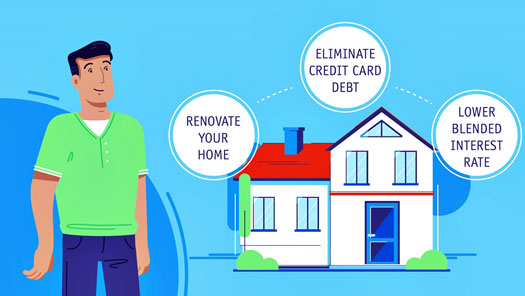Cash-Out Mortgages
Cash Out Mortgages
HOME / LOAN PRODUCTS / CASH OUT MORTGAGES
A cash out refinance is a replacement of your first mortgage that allows you to borrow against your existing home equity. The interest rates on a cash out refinancing are usually lower than the interest rates on home equity loans.

Your loan-to-value ratio, appraised value and credit score will all be key elements in determining if you qualify for a cash out refinance.
LTV: The maximum loan-to-value ratio is more conservative for a cash out refinance than a regular refinance. Maximum LTV for conforming loan limits is between 80% – 85% depending upon the loan product applied.
· Loan-to-Value Ratio Defined: The loan to value ratio is equal to the outstanding mortgage debt as a percentage of the home’s current market value.
· Formula: Mortgage amount owed / Appraised value
· Example: Borrower owes $80,000 on her mortgage. Borrower’s house is worth $100,000. $80,000 mortgage / $100,000 = 80% LTV ratio
Appraisal: The amount of equity that you can withdraw in a cash out refinance from your home is likely a small sliver of your overall home’s value. You will only be able to withdraw from your home’s value the difference between your existing mortgage balance and you required equity after closing. This means that getting a fair appraisal for your home’s value is essential. You will want to make sure that your appraiser is aware of the most recent sales of comparable homes in your neighborhood and any improvements that have added to your property.
Credit score: Your credit score will impact not only your interest rate but the type of cash out loan programs for which you are eligible. Your credit score will also impact your ability to qualify for our “hybrid” cash out program (see our Special Programs section for further details).
Cash Out Mortgages
HOME / LOAN PRODUCTS / CASH OUT MORTGAGES

A cash out refinance is a replacement of your first mortgage that allows you to borrow against your existing home equity. The interest rates on a cash out refinancing are usually lower than the interest rates on home equity loans.
Your loan-to-value ratio, appraised value and credit score will all be key elements in determining if you qualify for a cash out refinance.
LTV: The maximum loan-to-value ratio is more conservative for a cash out refinance than a regular refinance. Maximum LTV for conforming loan limits is between 80% – 85% depending upon the loan product applied.
· Loan-to-Value Ratio Defined: The loan to value ratio is equal to the outstanding mortgage debt as a percentage of the home’s current market value.
· Formula: Mortgage amount owed / Appraised value
· Example: Borrower owes $80,000 on her mortgage. Borrower’s house is worth $100,000. $80,000 mortgage / $100,000 = 80% LTV ratio
Appraisal: The amount of equity that you can withdraw in a cash out refinance from your home is likely a small sliver of your overall home’s value. You will only be able to withdraw from your home’s value the difference between your existing mortgage balance and you required equity after closing. This means that getting a fair appraisal for your home’s value is essential. You will want to make sure that your appraiser is aware of the most recent sales of comparable homes in your neighborhood and any improvements that have added to your property.
Credit score: Your credit score will impact not only your interest rate but the type of cash out loan programs for which you are eligible. Your credit score will also impact your ability to qualify for our “hybrid” cash out program (see our Special Programs section for further details).
